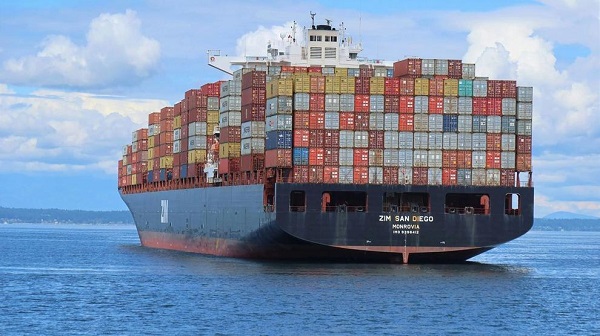Business
Sanctuary State Told To Cut Spending On Hotel Stays For Migrants As Costs Expected To Hit $1 Billion

From the Daily Caller News Foundation
By Jason Hopkins
A state commission is encouraging Massachusetts to cut costs on emergency shelter services for migrants and other families by spending less on expensive hotels.
The emergency shelter system in Massachusetts housing migrant families and others experiencing homelessness is expected to spend over $1 billion in fiscal year 2025, according to a state commission report investigating the matter. The report comes as Massachusetts, a sanctuary state that limits cooperation with federal immigration authorities, is continuing to experience financial hardship over the border crisis and an influx of migrants into their communities.
The draft report proposed spending less on the most expensive accommodations for migrants — which would include hotels and motels. Prior reports have found that housing migrants in hotels or motels in the state can be as costly as $300 per night.
“Since the EA shelter system reached capacity at 7,500 families last year, approximately 50% of families have been in hotels and motels across the state,” the report stated. “The Commission recommends limiting reliance on hotels and motels to best serve families and increase the financial and operational efficiency of the system, while recognizing that hotels and motels may be a last-resort option for surge capacity at times of rapid changes in demand.”
“Data suggests that hotels and motels are the most expensive type of shelter in the EA system,” the report concluded. It also noted that the state’s shelter caseload and system costs have skyrocketed to “unsustainable levels” since 2022.
The immigration crisis taking place under the Biden-Harris administration has hit Massachusetts particularly hard. Roughly 355,000 illegal migrants and other inadmissible foreign nationals live in the state, and approximately 50,000 have arrived since 2021, according to the Center for Immigration Studies.
Democrat Gov. Maura Healey, in her efforts to clamp down on the state’s crisis, has publicly called on illegal immigrants to not go to Massachusetts, offered plane tickets for them to leave, and has asked residents to take in migrant families. The state has also experienced a rising number of deportation cases as illegal migrants continue to flock there.
Despite the growing pains with mass illegal immigration, the governor has remained steadfast in her opposition to President-elect Donald Trump’s plans for an immigration crackdown, and she confirmed that her state’s law enforcement would “absolutely not” help with mass deportation efforts. The entire state of Massachusetts is considered a sanctuary for illegal migrants for its laws limiting cooperation with Immigration and Customs Enforcement (ICE) agents.
The state legislature appropriated $639 million to the emergency assistance shelter system for fiscal year 2025, according to the report. However, expense projections are expected to hit $1.094 billion – leaving a shortfall of roughly $455 million for the fiscal year.
Business
Here’s what pundits and analysts get wrong about the Carney government’s first budget

From the Fraser Institute
By Jason Clemens and Jake Fuss
Under the new budget plan, this wedge between what the government collects in revenues versus what is actually spent on programs will rise to 13.0 per cent by 2029/30. Put differently, slightly more than one in every eight dollars sent to Ottawa will be used to pay interest on debt for past spending.
The Carney government’s much-anticipated first budget landed on Nov. 4. There’s been much discussion by pundits and analysts on the increase in the deficit and borrowing, the emphasis on infrastructure spending (broadly defined), and the continued activist approach of Ottawa. There are, however, several critically important aspects of the budget that are consistently being misstated or misinterpreted, which makes it harder for average Canadians to fully appreciate the consequences and costs of the budget.
One issue in need of greater clarity is the cost of Canada’s indebtedness. Like regular Canadians and businesses, the government must pay interest on federal debt. According to the budget plan, total federal debt will reach an expected $2.9 trillion in 2029/30. For reference, total federal debt stood at $1.0 trillion when the Trudeau government took office in 2015. The interest costs on that debt will rise from $53.4 billion last year to an expected $76.1 billion by 2029/30. Several analyses have noted this means federal interest costs will rise from 1.7 per cent of GDP to 2.1 per cent.
These are all worrying statistics about the indebtedness of the federal government. However, they ignore a key statistic—interest costs as a share of revenues. When the Trudeau government took office, interest costs consumed 7.5 per cent of revenues. This means taxpayers were foregoing 7.5 per cent of the resources they sent to Ottawa (in terms of spending on actual programs) because these monies were used to pay interest on debt accumulated from previous spending.
Under the new budget plan, this wedge between what the government collects in revenues versus what is actually spent on programs will rise to 13.0 per cent by 2029/30. Put differently, slightly more than one in every eight dollars sent to Ottawa will be used to pay interest on debt for past spending. This is one way governments get into financial problems, even crises, by continually increasing the share of revenues consumed by interest payments.
A second and fairly consistently misrepresented aspect of the budget pertains to large spending initiatives such as Build Canada Homes and Build Communities Strong Fund. The former is meant to increase the number of new homes, particularly affordable homes, being built annually and the latter is intended to provide funding to provincial governments (and through them, municipalities) for infrastructure spending. But few analysts question whether or not these programs will produce actual new spending for homebuilding or simply replace or “crowd-out” existing spending by the private sector.
Let’s first explore the homebuilding initiative. At any point in time, there are a limited number of skilled workers, raw materials, land, etc. available for homebuilding. When the federal government, or any government, initiates its own homebuilding program, it directly competes with private companies for that skilled labour (carpenters, electricians, etc.), raw materials (timber, concrete, etc.) and the land needed for development. Put simply, government homebuilding crowds out private-sector activity.
Moreover, there’s a strong argument that the crowding out by government results in less homebuilding than would otherwise be the case, because the incentives for private-sector homebuilding are dramatically different than government incentives. For example, private firms risk their own wealth and wellbeing (and the wellbeing of their employees) so they have very strong incentives to deliver homes demanded by people on time and at a reasonable price. Government bureaucrats and politicians, on the other hand, face no such incentives. They pay no price, in terms of personal wealth or wellbeing if homes, are late, not what consumers demand, or even produce less than expected. Put simply, homebuilding by Ottawa could easily result in less homes being built than if government had stayed out of the way of entrepreneurs, businessowners and developers.
Similarly, it’s debatable that infrastructure spending by Ottawa—specifically, providing funds to the provinces and municipalities—results in an actual increase in total infrastructure spending. There are numerous historical examples, including reports by the auditor general, detailing how similar infrastructure spending initiatives by the federal government were plagued by mismanagement. And in many circumstances, the provinces simply reduced their own infrastructure spending to save money, such that the actual incremental increase in overall infrastructure spending was negligible.
In reality, some of the major and large spending initiatives announced or expanded in the Carney government’s first budget, which will accelerate the deterioration of federal finances, may not deliver anything close to what the government suggests. Canadians should understand the real risks and challenges in these federal spending initiatives, along with the debt being accumulated, and the limited potential benefits.
Business
Carney budget continues misguided ‘Build Canada Homes’ approach

From the Fraser Institute
By Jake Fuss and Austin Thompson
The Carney government’s first budget tabled on Tuesday promises to “supercharge” homebuilding across the country. But Ottawa’s flagship housing initiative—a new federal agency, Build Canada Homes (BCH)—risks “supercharging” federal debt instead while doing little to boost construction.
The budget accurately diagnoses the root cause of Canada’s housing shortage—costly red tape on housing projects, sky-high taxes on homebuilders, and weak productivity growth in the construction sector. But the proposed cure, BCH, does nothing to fix these problems despite receiving a five-year budget of $13 billion.
BCH’s core mandate is to build and finance affordable housing projects. But this mission is muddled by competing political priorities to preference Canadian building materials and prioritize “sustainable” construction materials. Any product that needs a government preference to be used is clearly not the most cost-effective option. The result—BCH’s “affordable” homes will cost more than they needed to, meaning more tax dollars wasted.
Ottawa claims BCH will improve construction productivity by “generating demand” (read: splashing out tax dollars) for factory-built housing. This logic is faulty—where factory-built housing is a cost-effective and desirable option, private developers are already building it. “Prioritizing” factory-built homes amounts to Ottawa trying to pick winners and losers—a strategy that reliably wastes taxpayer dollars. The civil servants running BCH lack the market knowledge and cost-cutting incentives of private homebuilders, who are far better positioned to identify which technologies will deliver the affordable homes Canadians need.
The government also insists BCH projects will attract more private investment for housing. The opposite is more likely—BCH projects will compete with private developers for limited investment dollars and construction labour. Ottawa’s intrusion into housing development could ultimately mean fewer private-sector housing projects—those driven by the real needs of homebuyers and renters, not the Carney government’s political priorities.
Despite its huge budget and broad mandate, BCH still lacks clear goals. Its only commitment so far is to “build affordable housing at scale,” with no concrete targets for how many new homes or how affordable they’ll be. Without measurable outcomes, neither Ottawa nor taxpayers will know whether BCH delivers value for money.
You can’t solve Canada’s housing crisis with yet another federal program. Ottawa should resist the temptation to act as a housing developer and instead create fiscal and economic conditions that allow the private sector to build more homes.
-

 Daily Caller1 day ago
Daily Caller1 day agoUS Eating Canada’s Lunch While Liberals Stall – Trump Admin Announces Record-Shattering Energy Report
-

 espionage13 hours ago
espionage13 hours agoU.S. Charges Three More Chinese Scholars in Wuhan Bio-Smuggling Case, Citing Pattern of Foreign Exploitation in American Research Labs
-

 Censorship Industrial Complex2 days ago
Censorship Industrial Complex2 days agoHow the UK and Canada Are Leading the West’s Descent into Digital Authoritarianism
-

 Business20 hours ago
Business20 hours agoU.S. Supreme Court frosty on Trump’s tariff power as world watches
-

 Energy1 day ago
Energy1 day agoEby should put up, shut up, or pay up
-

 Business2 days ago
Business2 days agoCapital Flight Signals No Confidence In Carney’s Agenda
-

 Justice1 day ago
Justice1 day agoCarney government lets Supreme Court decision stand despite outrage over child porn ruling
-

 International2 days ago
International2 days agoThe capital of capitalism elects a socialist mayor








